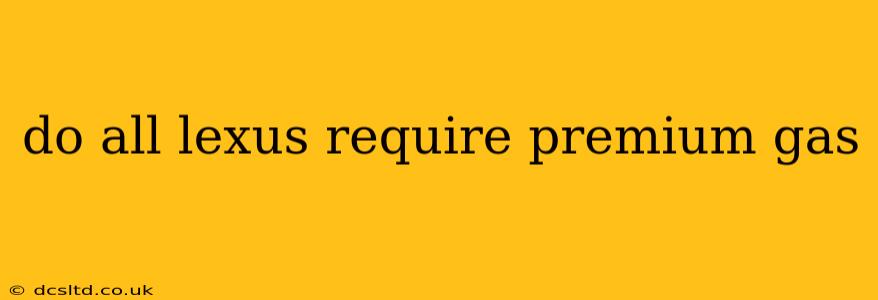Do All Lexus Require Premium Gas?
No, not all Lexus vehicles require premium gasoline. While many Lexus models recommend or require premium fuel for optimal performance and engine longevity, several models are perfectly happy running on regular unleaded. The fuel requirement is specifically detailed in your owner's manual, and it's crucial to consult this document for your specific Lexus model and year. Ignoring this recommendation can lead to reduced performance, potential engine damage, and voiding your warranty.
What determines the fuel requirement for a Lexus?
The type of engine plays the most significant role in determining the fuel requirement. Lexus vehicles with high-performance engines, often featuring forced induction (turbocharging or supercharging), typically demand premium fuel. These engines are designed to operate under higher compression ratios and need the higher octane rating of premium gas to prevent knocking or pre-ignition. Knocking is a damaging engine condition that occurs when the air-fuel mixture ignites prematurely.
Engines with lower compression ratios, or those without forced induction, may run perfectly well on regular unleaded gasoline. Lexus engineers carefully calibrate each engine to achieve the best possible balance between performance and fuel efficiency, and the fuel recommendation reflects this.
How can I tell if my Lexus needs premium gas?
The easiest and most reliable method is to check your owner's manual. This document is tailored to your specific vehicle and will clearly state the recommended or required fuel type. The information will typically be found in a section detailing vehicle specifications or maintenance. You'll also usually find this information on a sticker inside the fuel filler door.
Beyond the manual, the fuel type will often be indicated in the car's onboard computer system when the fuel cap is opened. This is a handy visual reminder each time you fill up.
What happens if I use regular gas in a Lexus that requires premium?
Using regular unleaded gas in a Lexus that requires premium could lead to several negative consequences:
- Reduced Performance: The engine might struggle to produce its full horsepower and torque, leading to sluggish acceleration and overall lower performance.
- Engine Knocking/Pinging: This is a harsh metallic sound caused by pre-ignition. Persistent knocking can severely damage engine components.
- Reduced Fuel Efficiency: You might actually see a decrease in fuel economy.
- Check Engine Light: Your car's onboard diagnostic system might illuminate a check engine light, alerting you to a potential problem.
- Warranty Issues: Using the wrong fuel type could void your warranty if the damage is directly attributed to this.
While using premium gas in a Lexus designed for regular gas is unlikely to cause any damage (it will simply be more expensive), using regular in a car designed for premium is strongly discouraged.
What is the octane rating?
Octane rating is a measure of a gasoline's resistance to knocking or pre-ignition. Higher octane numbers indicate greater resistance. Premium gasoline typically has an octane rating of 91 or higher, while regular unleaded usually falls in the 87-89 range.
In summary, while many Lexus models use premium fuel, not all do. Always consult your owner's manual for definitive information on the recommended or required fuel type for your specific Lexus vehicle to ensure optimal performance and engine health.
